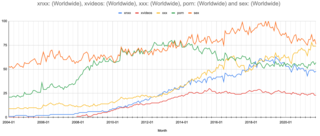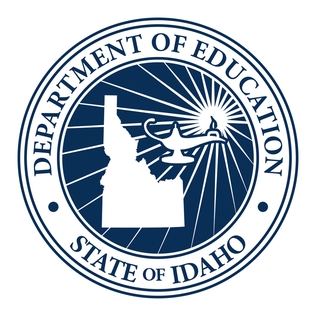Related Research Articles
A shock site is a website that is intended to be offensive or disturbing to its viewers, though it can also contain elements of humor or evoke sexual arousal. Shock-oriented websites generally contain material that is pornographic, scatological, racist, antisemitic, sexist, graphically violent, insulting, vulgar, profane, or otherwise some other provocative nature. Websites that are primarily fixated on real death and graphic violence are particularly referred to as gore sites. Some shock sites display a single picture, animation, video clip or small gallery, and are circulated via email or disguised in posts to discussion sites as a prank. Steven Jones distinguishes these sites from those that collect galleries where users search for shocking content, such as Rotten.com. Gallery sites can contain beheadings, execution, electrocution, suicide, murder, stoning, torching, police brutality, hangings, terrorism, cartel violence, drowning, vehicular accidents, war victims, rape, necrophilia, genital mutilation and other sexual crimes.

Pornography has existed since the origins of the United States, and has become more readily accessible in the 21st century. Advanced by technological development, it has gone from a hard-to-find "back alley" item, beginning in 1969 with Blue Movie by Andy Warhol, the Golden Age of Porn (1969–1984) and home video, to being more available in the country and later, starting in the 1990s, readily accessible to nearly anyone with a computer or other device connected to the Internet. The U.S. has no current plans to block explicit content from children and adolescents, as many other countries have planned or proceeded to do.

Pornography laws by region vary throughout the world. The production and distribution of pornographic films are both activities that are legal in some but not all countries, as long as the pornography features performers above a certain age, usually 18 years. Further restrictions are often placed on such material.

Open educational resources (OER) are teaching, learning, and research materials intentionally created and licensed to be free for the end user to own, share, and in most cases, modify. The term "OER" describes publicly accessible materials and resources for any user to use, re-mix, improve, and redistribute under some licenses. These are designed to reduce accessibility barriers by implementing best practices in teaching and to be adapted for local unique contexts.

The Children's Internet Protection Act (CIPA) is one of a number of bills that the United States Congress proposed to limit children's exposure to pornography and explicit content online.

The PROTECT Act of 2003 is a United States law with the stated intent of preventing child abuse as well as investigating and prosecuting violent crimes against children. "PROTECT" is a backronym which stands for "Prosecutorial Remedies and Other Tools to End the Exploitation of Children Today".

EBSCO Information Services, headquartered in Ipswich, Massachusetts, is a division of EBSCO Industries Inc., a private company headquartered in Birmingham, Alabama. EBSCO provides products and services to libraries of many types around the world. Its products include EBSCONET, a complete e-resource management system, and EBSCOhost, which supplies a fee-based online research service with 375 full-text databases, a collection of 600,000-plus ebooks, subject indexes, point-of-care medical references, and an array of historical digital archives. In 2010, EBSCO introduced its EBSCO Discovery Service (EDS) to institutions, which allows searches of a portfolio of journals and magazines.
Stanley v. Georgia, 394 U.S. 557 (1969), was a landmark decision of the Supreme Court of the United States that helped to establish an implied "right to privacy" in U.S. law in the form of mere possession of obscene materials.
An age verification system, also known as an age gate, is any technical system that externally verifies a person's age. These systems are used primarily to restrict access to content classified, either voluntarily or by local laws, as being inappropriate for users under a specific age, such as alcohol, tobacco, gambling, video games with objectionable content, pornography, or to remain in compliance with online privacy laws that regulate the collection of personal information from minors, such as COPPA in the United States.
The Deleting Online Predators Act of 2006 (DOPA) is a bill brought before the United States House of Representatives on May 9, 2006 by Republican Pennsylvania Representative (R-PA) Mike Fitzpatrick. The bill, if enacted, would have amended the Communications Act of 1934, requiring schools and libraries that receive E-rate funding to protect minors from online predators in the absence of parental supervision when using "Commercial Social Networking Websites" and "Chat Rooms". The bill would prohibit schools and libraries from providing access to these types of websites to minors or create restrictions to use of these type of sites. The bill also would require the institutions to be capable of disabling the restrictions for "use by an adult or by minors with adult supervision to enable access for educational purposes."
The National Center on Sexual Exploitation (NCOSE), previously known as Morality in Media and Operation Yorkville, is an American conservative anti-pornography organization. The group has also campaigned against sex trafficking, same-sex marriage, sex shops and sex toys, decriminalization of sex work, comprehensive sex education, and various works of literature or visual arts the organization has deemed obscene, profane or indecent. Its current president is Patrick A. Trueman. The organization describes its goal as "exposing the links between all forms of sexual exploitation".
Internet censorship in the United States is the suppression of information published or viewed on the Internet in the United States. The First Amendment of the United States Constitution protects freedom of speech and expression against federal, state, and local government censorship.

Pornography in India is restricted and illegal in all form including print media, electronic media, and digital media (OTT). Hosting, displaying, uploading, modifying, publishing, transmitting, storing, updating or sharing pornography is illegal in India.
Internet censorship in the United Kingdom is conducted under a variety of laws, judicial processes, administrative regulations and voluntary arrangements. It is achieved by blocking access to sites as well as the use of laws that criminalise publication or possession of certain types of material. These include English defamation law, the Copyright law of the United Kingdom, regulations against incitement to terrorism and child pornography.

Internet pornography is any pornography that is accessible over the Internet; primarily via websites, FTP connections, peer-to-peer file sharing, or Usenet newsgroups. The greater accessibility of the World Wide Web from the late 1990s led to an incremental growth of Internet pornography, the use of which among adolescents and adults has since become increasingly popular.

The Idaho State Department of Education is an executive agency of the Idaho state education system. The department is responsible for public elementary and secondary school matters as provided by Title 33, Idaho Code, or as determined by the Idaho State Board of Education. It is headquartered in the state capital, Boise, Idaho.
The Pornography Victims Compensation Act of 1991 was a bill, S. 983, in the U.S. Congress. The sponsor in the Senate was Senator Mitch McConnell with eight cosponsors. A Senate committee held hearings on the bill. The bill was not voted on, did not pass, and did not become law.
California's Assembly Bill 540 was signed into law by Governor Gray Davis on October 12, 2001, allowing access to in-state tuition rates for undocumented and other eligible students at California's public colleges and universities. The law allows students who attended high school in California, among other eligibility requirements, to pay in-state tuition fees instead of out-of-state tuition at California's public institutions of higher education, including the University of California, California State University, and California Community Colleges. The law has been important in the pursuit of college accessibility for undocumented students in California, but not all beneficiaries are undocumented, as approximately two thirds of those benefitted possess U.S. citizenship.

Baku Higher Oil School is an institution of higher education in Baku, Azerbaijan.
References
- 1 2 3 4 5 6 7 8 9 10 11 12 13 14 15 "POLICY BRIEF: Weathering the Attacks on State Library Database Contracts - Policy Report". EveryLibrary Institute. Retrieved 2024-03-20.
- 1 2 3 4 5 6 7 8 SNOWDON, QUINCY (2018-10-11). "Conservative law firm files suit against educational database that allegedly provided access to porn in Cherry Creek schools". Sentinel Colorado. Retrieved 2024-03-19.
- 1 2 3 4 5 6 7 8 9 10 11 Natanson, Hannah (2022-05-11). "The next book ban: States aim to limit titles students can search for". Washington Post. ISSN 0190-8286 . Retrieved 2024-03-19.
- 1 2 3 Zubrzycki, Jaclyn (2017-07-14). "Do Online Databases Filter Out Enough Inappropriate Material?". Education Week. ISSN 0277-4232 . Retrieved 2024-03-20.
- 1 2 3 4 5 6 7 8 9 10 11 12 13 Taylor, Jillian (2022-12-15). "Oklahoma law impacts K-12 research in OU Libraries, mirrors bills targeting academic databases nationwide". OU Daily. Retrieved 2024-03-20.
- 1 2 3 HERTHER, NANCY (2019-03-25). "ATG Original: Censorship & The Struggle Over Content in The Internet Age: Part 1". Charleston Hub. Retrieved 2024-03-19.
- 1 2 Office of Intellectual Freedom (2023-03-20). "Book Ban Data". American Library Association. Retrieved 2024-03-20.
- 1 2 3 "New Tennessee laws to take effect July 1, 2022". Local3News.com. 2022-07-01. Retrieved 2024-03-20.
- 1 2 3 4 5 EveryLibrary (2023-06-20). "Unpacking 2023 Legislation of Concern for Libraries". EveryLibrary. Retrieved 2024-03-20.
- 1 2 "Why Are Some Parents Trying to Take School Library Databases Offline? - EdSurge News". EdSurge. 2022-12-01. Retrieved 2024-03-21.
- 1 2 Vaughn, Jason (2022-05-16). "TN Law To Protect Students From Digital Obscenity & Pornography To Go Into Effect For Fall Semester". Tennessee Conservative. Retrieved 2024-03-20.
- 1 2 3 4 5 6 7 8 9 10 11 12 13 LaRue, James (Fall 2017). "False Witness: Morality in Media and EBSCO". Journal of Intellectual Freedom and Privacy. 2 (3–4): 13–19. doi:10.5860/jifp.v2i3-4.6577.
- ↑ "Frequently Asked Questions » Britannica". Britannica. Retrieved 2024-03-20.
- ↑ "Middle Online Package | EBSCO". www.ebsco.com. Retrieved 2024-03-20.
- ↑ "Middle Search Plus Periodical Title List". www.ebsco.com. Retrieved 2024-03-20.
- ↑ Scharn, Tracy. "LibGuides: General Guide to Library Research: When You Hit a Paywall". oit.libguides.com. Retrieved 2024-03-20.
- ↑ "The Digital Closet". MIT Press. Retrieved 2024-03-20.
- 1 2 3 Bray, Hiawatha (2018-10-19). "EBSCO accused of including smut in school databases". Boston Globe. Retrieved 2024-03-20.
- 1 2 3 "Lawsuit alleging Colorado libraries pushed porn is dismissed". The Denver Post. 2019-03-08. Retrieved 2024-03-19.
- 1 2 3 4 Seter & Vander Wall, P.C. (2019-03-06). "MEMORANDUM to Poudre River Public Library District" (PDF). Poudre River Public Library District.
- 1 2 3 4 5 6 7 Rodgers, Bethany (2020-09-17). "The danger in Utah schools — porn or censorship?". The Salt Lake Tribune. Retrieved 2024-03-19.
- 1 2 3 4 5 6 7 8 9 10 11 Stoddard, Martha (2022-02-21). "Bill aims to block Nebraska students from accessing obscene materials". Omaha World-Herald. Retrieved 2024-03-19.
- 1 2 "Judiciary Committee" (PDF). Nebraska Legistlature. 2022-02-09.
- ↑ "Regular Board of Education Meeting Minutes". Cherry Creek School District Boarddocs. 2017-01-09.
- ↑ LaRue, Jamie (2018-10-12). "Education is not pornography". Intellectual Freedom Blog. Retrieved 2024-03-19.
- ↑ "How schools & libraries bring pornography to vulnerable children". www.massresistance.org. Retrieved 2024-03-19.
- 1 2 Augé, Karen (2019-04-02). "Protecting kids from porn? Assaulting free speech? Library critics take aim at public databases". The Colorado Sun. Retrieved 2024-03-19.
- ↑ Quinn, Annalisa (2013-04-02). "Book News: American Library Association, Barnes & Noble Called 'Facilitators Of Porn'". NPR.
- ↑ "Colorado Judicial Branch - Glossary of terms". www.courts.state.co.us. Retrieved 2024-03-19.
- ↑ "With prejudice". Legal Information Institute of Cornell University Law School. Retrieved 2024-03-19.
- ↑ Ciesielka, Tom. "Your Kids Can Access Porn Through This Popular School Database". Charisma News. Retrieved 2024-03-19.
- ↑ "Important Update about challenges to EBSCO databases – IUPUI Department of Library and Information Science". blogs.iu.edu. Retrieved 2024-03-20.
- ↑ ALSC Intellectual Freedom Committee (2018-12-15). "Censoring Databases". ALSC Blog. Retrieved 2024-03-20.
- ↑ Roberts, Chris (2018-09-21). "Beyond The Books: Utah mom finds pornographic pics on Utah Education Network database". KUTV. Retrieved 2024-03-19.
- 1 2 3 4 5 "EBSCO Quarterly Report 2019 for Utah Education Network (UEN)" (PDF). Utah Education Network. 2019-12-31.
- ↑ "EBCSO Monitoring". Utah Educational Network. Archived from the original on 2023-12-08. Retrieved 2024-03-21.
- 1 2 "Hundreds of new Utah laws take effect Wednesday — what changes for you?". Deseret News. 2023-12-20. Retrieved 2024-03-20.
- 1 2 "Tennessee General Assembly Legislation". wapp.capitol.tn.gov. Retrieved 2024-03-20.
- 1 2 "HOUSE BILL 522 – Idaho State Legislature" . Retrieved 2024-03-20.
- 1 2 "Bill Information". www.oklegislature.gov. Retrieved 2024-03-20.
- ↑ "HB0038". le.utah.gov. Retrieved 2024-03-20.
- ↑ "Section 33-137 – Idaho State Legislature" . Retrieved 2024-03-20.
- ↑ "MINUTES: HOUSE EDUCATION COMMITTEE" (PDF). Idaho Legistlature. 2020-02-24. p. 119. Retrieved 2024-03-21.
- ↑ Baker, Dylan (2020-06-24). "Lilischools.org Brings Students a Scaled-Down Research Option — in Compliance with New Idaho Code 33-137". Idaho Commission for Libraries. Retrieved 2024-03-20.
- ↑ Wendling, Zach (2024-03-18). "Bills addressing obscenity in schools, pornography advance to full Nebraska Legislature • Nebraska Examiner". Nebraska Examiner. Retrieved 2024-03-21.
- 1 2 "Mississippi Legislature 2023 Regular Session House Bill 1315". Mississippi Legistlature. 2023-12-07.
- ↑ Summerhays, Anne (2023-03-27). "Mississippi House adopts conference report regulating minors' access to online pornographic materials". Magnolia Tribune. Retrieved 2024-03-22.
- ↑ Mitchell, Jerry; Cunningham, Ann Marie (2023-03-16). "Mississippi's Own Angie Thomas: Her Most Popular Book Is Missing from Library Shelves". Mississippi Today. Retrieved 2024-03-22.
- ↑ "SB 394: "Restricting Explicit and Adult-designated Educational Resources (READER) Act"". Georgia Legistlature. 2024.
- ↑ "SB1007: schools; sexually explicit materials; classification". 2024.
- 1 2 3 4 5 6 Bauld, Andrew. "As Censors Target Online Resources, Student Searches Come Up Empty". School Library Journal. Retrieved 2024-03-20.